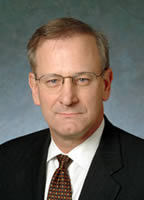Obama wants FDIC Board leadership position to go to Federal Reserve heavyweight
The White House announced Friday that it will nominate Thomas M.
Jul 31, 20204.2K Shares606K Views
The White House announced Friday that it will nominate Thomas M. Hoenig, a native of Fort Madison, to the position of vice-chairman of the board of directors for the Federal Deposit Insurance Corporation.
Tom Hoenig
Hoenig, the son of a local plumber and a graduate of St. Benedict’s College (now Benedictine College) in Kansas and Iowa State University, began serving on Oct. 1, 1991 as a chief executive of the Tenth District Federal Reserve Bank in Kansas City, Kan. He had begun serving as an economist in the banking supervision area for the Kansas City Fed in 1973. This past March he announced his plan to retire from the board on Oct. 1, as required under the Federal Reserve Board’s rules for presidents.
He is a trustee of the Ewing Marion Kauffman Foundation and serves on the boards of Midwest Research Institute and Union Station.
Hoenig was called by U.S. Rep. Ron Paul in July to provide testimony before the Domestic Monetary Policy and Technology Subcommittee, which Paul leads. The hearing, “Impact of Monetary Policy on the Economy: A Regional Fed Perspective on Inflation, Unemployment and QE3,” was called to provide oversight of liquidity operations undertaken by the Federal Reserve and also to explore price stability and employment.
As a member of the banking supervision area during the banking and farm crisis of the 1980s, Hoenig relied on his past experiences while explaining the role of the Federal Reserve and his support of cuts to the federal funds rate as well as other liquidity actions taken in response to the crisis.
“However, though I would support a generally accommodative monetary policy today, I have raised questions regarding the advisability of keeping the emergency monetary policy in place for 32 months with the promise of keeping it there for an extended period,” Hoenig told the subcommittee.
“I have several concerns with zero rates. First, a guarantee of zero rates affects the allocation of resources. It is generally accepted that no good, service or transaction trades efficiently at the price of zero. Credit is no exception. Rather, a zero-rate policy increases the risk of misallocating real resources, creating a new set of imbalances of possibly a new set of bubbles.”
During the farm and banking crisis, he was involved in the closing of more than 300 regional and community banks.
“Farms were lost, communities were devastated, and thousands of jobs were lost in the energy and real estate sectors,” he noted. “I am confident that the highly accommodative monetary policy of the decade of the ’70s contributed to this crisis.”
In addition to his objections to immediate zero rates, Hoenig believes unemployment is soaring at this time at least in part because interest rates were held artificially low during the early 2000s.
“In 2003, unemployment at 6.5 percent was thought to be too high,” he said. “The federal funds rate was continuously lowered to a level of 1 percent in an effort to avoid deflation and to lower unemployment. The policy worked in the short term.
“The full effect, however, was that the U.S. experienced a credit boom with consumers increasing their debt from 80 percent of disposable income to 125 percent. Banks increased their leverage ratios — assets to equity capital — from 15-to-1 to 30-to-1. This very active credit environment persisted over time and contributed to the bubble in the housing market. In just five years, the housing bubble collapsed and asset values have fallen dramatically. The debt levels, however, remain, impeding our ability to recover from this recession. I would argue that the result of our short-run focus in 2003 was to contribute to 10 percent unemployment five years later.”
Monetary policy, he argued before the subcommittee, cannot solve every problem.
“I believe we put the economy at greater risk by attempting to do so,” he added.
A few weeks prior to his testimony, Hoenig was a guest lecturer at Purdue University, his remarks titled “Sowing the Seeds: Monetary Policy and the Ag Economy.” Video of that discussion is embedded below.
The FDIC is an independent agency, created by Congress, tasked with maintaining stability and public confidence in the nation’s financial system. It does so by insuring deposits, providing oversight of financial institutions and managing receiverships. Since the FDIC began insuring deposits in 1934, no depositor has lost any money as a result of a bank failure.
The agency is governed by a five-person board. Members of the body are nominated by the President and confirmed by the U.S. Senate. No more than three members may share the same political affiliation. The board is currently comprised of three membersdue to retirements.
Hoenig is currently a resident of Kansas City.

Hajra Shannon
Reviewer
Latest Articles
Popular Articles
